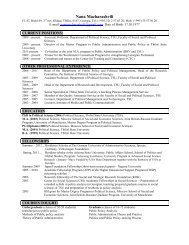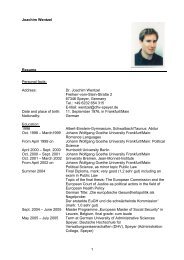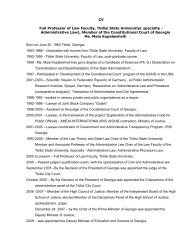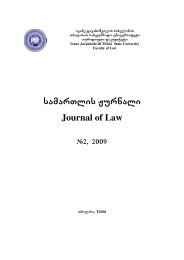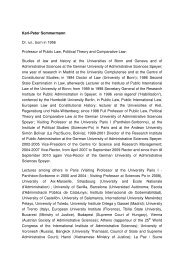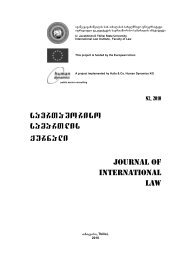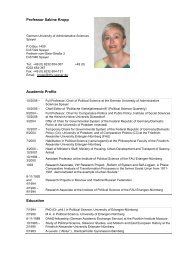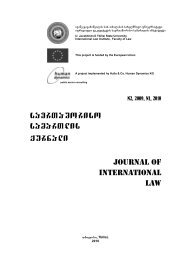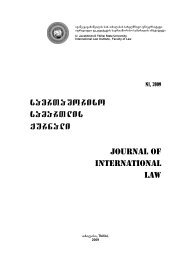Untitled
Untitled
Untitled
You also want an ePaper? Increase the reach of your titles
YUMPU automatically turns print PDFs into web optimized ePapers that Google loves.
saerTaSoriso samarTlis Jurnali, #1, 2008 JOURNAL OF INTERNATIONAL LAW, N1, 2008<br />
2. Military manures or study by exercising<br />
weapons of any kind;<br />
3. Activity aimed at collecting information to<br />
the prejudice of the defence or security of<br />
Georgia;<br />
4. Act of propaganda aimed at affecting the<br />
defence or security interests of Georgia;<br />
5. The launching or taking on board of any<br />
aircraft;<br />
6. The launching or taking on board of any<br />
military device;<br />
7. The loading or unloading of any commodity<br />
and currency or person contrary to the<br />
customs, fiscal, immigration or sanitary laws<br />
and regulations;<br />
8. Wilful and serious pollution of marine environment;<br />
9. Fishing;<br />
10. The carrying out of scientific-research,<br />
survey or hydrographic activities;<br />
11. Act aimed at interfering with any systems<br />
of communication and electronic systems<br />
or other facilities or installations;<br />
12. Any other activity not having a direct bearing<br />
on innocent passage. 37<br />
However, the right of innocent passage<br />
does not restrict the jurisdiction of coastal<br />
States over such ships. In particular, the coastal<br />
State is entitled to adopt laws and establish<br />
regulations on navigation and navigational<br />
aids, as well as cables, living resources of the<br />
sea, fishing and other issues. 38 Throughout<br />
the innocent passage, all ships are obliged to<br />
perform and observe laws and regulations of<br />
a coastal State. But, the costal State shall not<br />
establish discriminative rules with respect to<br />
the flag or type of a ship. 39<br />
Following to the Convention, in exceptional<br />
cases the coastal State may suspend the<br />
rights of innocent passage in specified areas<br />
of its territorial sea for the purposes of security<br />
protection of its country, or during the military<br />
exercises. But, such suspension shall be<br />
done on non-discriminative basis and take<br />
effect only after having been duly published. 40<br />
Provisions of part XII of the Convention entitle<br />
the costal State to exercise executive jurisdiction<br />
over the ship violating the regulations<br />
on the protection of maritime environment. 41<br />
The costal state is not entitled to prevent passage<br />
unless a ship is polluting its territorial sea<br />
“wilfully and seriously”. Though, there is no any<br />
common criterion on the “serious” pollution and<br />
it depends on particular features of a coasts<br />
and legislation of the coastal State, since the<br />
later is entitled to adopt laws for the ships in<br />
the regime of innocent passage, regarding the<br />
environmental protection. Although, in accordance<br />
with the same Convention, the coastal<br />
State whilst exercising its legislative jurisdiction<br />
is not entitled to adopt laws, which in fact restricts<br />
the right to an innocent passage. 42 For<br />
the purposes of ensuring environmental protection,<br />
following to Article 22 of the Convention,<br />
the coastal State is entitled to establish<br />
sea lines and corridors for vessels ships, which<br />
shall be applied by the latter during the innocent<br />
passage.<br />
As regards to executive jurisdiction of<br />
coastal State, in accordance with paragraph<br />
2 of Article 220 of the Convention, a State is<br />
entitled to inspect or detain the ship, where<br />
the evidence warrants that while it was staying<br />
in its territorial sea has violated the laws<br />
of the State, regarding prevention, reduction<br />
and control of marine environment pollution<br />
from the vessels adopted on the basis of international<br />
law. However, the abovementioned<br />
regulation shall be applied to vessels in of innocent<br />
passage, without prejudice to Articles 24<br />
and 27.<br />
As it was stated above, in accordance with<br />
Article 24, in the process of exercising legislative<br />
jurisdiction, the coastal State shall not<br />
hamper the right of innocent passage. Article<br />
27 provides for the terms of exercising criminal<br />
jurisdiction on the territorial sea that will<br />
be discussed below in more details.<br />
During the innocent passage, regulations<br />
adopted by the coastal State on introduction<br />
of permit system for innocent passage of vessel<br />
may be considered as an expression of<br />
State sovereignty. Especially it refers to warships<br />
and nuclear-powered ships. 43<br />
Regarding to the criminal jurisdiction over<br />
the territorial sea, Article 26 of the Convention<br />
grants the State with the right to exercise<br />
it only in three cases.<br />
Firss case concerns the commitment of a<br />
crime on a board of a ship in innocent passage,<br />
if:<br />
1. The consequences of the crime extend to<br />
the coastal State;<br />
2. The crime is of a kind to disturb the peace<br />
of the coastal State and/or the good order<br />
in its territorial sea;<br />
3. The assistance of the local authorities has<br />
been requested by the captain of the ship<br />
96



